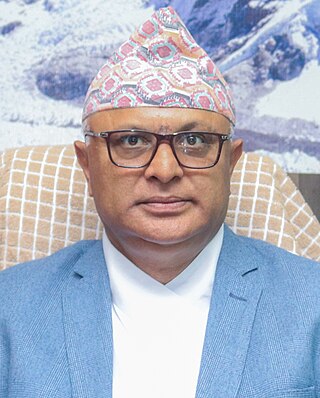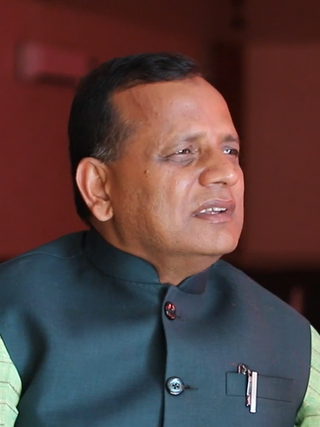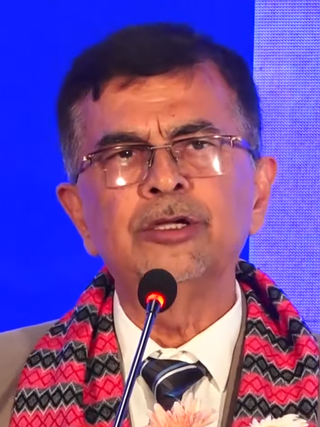
The Communist Party of Nepal (Unified Marxist–Leninist) (Nepali: नेपाल कम्युनिष्ट पार्टी (एकीकृत मार्क्सवादी-लेनिनवादी), romanized: nēpāl kamyuniṣṭ pārṭī (ēkīkṛt mārksavādī-lēninavādī); abbr. CPN (UML)) is a communist political party in Nepal. The party emerged as one of the major parties in Nepal after the end of the Panchayat era.

The Minister for Internal Affairs and Law (or simply, the Internal Minister, is the head of the Ministry of Internal Affairs and Law of the Government of Koshi Province. One of the senior-most officers in the Provincial Cabinet, the minister is responsible for maintain peace and state security; the state's police force and investigation bureau comes under its jurisdiction. Occasionally, they are assisted by the Minister of State for Internal Affairs and Law.

The Minister for Industry, Agriculture and Cooperatives is the head of the Ministry of Industry, Agriculture and Cooperatives of the Government of Koshi Province. One of the senior-most officers in the Provincial Cabinet, the minister is responsible for promoting the cooperative sector in national development and adopting policies related to agriculture and land reform, realising the need for land management, formulation implementation and regulation of land management in Koshi Province.

Karnali Province is one of the seven federal provinces of Nepal formed by the new constitution, which was adopted on 20 September 2015. The total area of the province is 27,984 square kilometres (10,805 sq mi), making it the largest province in Nepal with 18.97% of the country's area. According to the 2011 Nepal census, the population of the province was 1,570,418, making it the least populous province in Nepal. The province borders the Tibet Autonomous Region of China to the north, Gandaki Province to the east, Sudurpashchim Province to the west, and Lumbini Province to the south. Birendranagar with a population of 154,886 is both the province's capital and largest city.

Mahmood Khan is a Pakistani politician who was the Chief Minister of Khyber Pakhtunkhwa from August 2018 till January 2023 and a member of the Pakistan Tehreek-e-Insaf (PTI). He had been a member of the Provincial Assembly of Khyber Pakhtunkhwa from August 2018 till January 2023, when he, as Chief Minister, dissolved the Assembly. His tenure as Chief Minister saw various healthcare initiatives surrounding the Sehat Insaf Card, where he primarily focused on expanding the card to achieve universal free healthcare.

Lalbabu Raut also knows as Mohamed Lalbabu raut is the first Chief Minister of Madhesh Province, one of the seven federal Provinces of Nepal. He is the parliamentary party leader of People's Socialist Party, Nepal for Madhesh Province.

The Koshi Provincial Assembly also known as the Koshi Pradesh Sabha, is the unicameral legislature of Koshi Province, one of the seven provinces in Nepal. The assembly is seated at the provincial capital at Biratnagar in Morang District at the District Coordination Committee Office. The assembly has 93 members of whom 56 are elected through first-past-the-post voting and 37 are elected through proportional representation. The term of the assembly is 5 years unless dissolved earlier.
Dormani Poudel was sworn in as Chief Minister of Bagmati Province on 12 February 2018. Here is the list of ministers.

Krishna Chandra Nepali was sworn in as Chief Minister of Gandaki Province on 12 June 2021. This government was supported by CPN(Maoist-Centre), NSP while Rastriya Janamorcha supported without joining the government.
Kul Prasad KC is a Nepalese politician and former Chief Minister of Lumbini Province, a province in western Nepal. He was unanimously selected Parliamentary Party leader of CPN(Maoist-centre) for Lumbini Province in 2018. KC was elected from Rolpa 1(A) to provincial Assembly of Lumbini province.
The Jeevan Bahadur Shahi cabinet is the council assembled by Jeevan Bahadur Shahi, who was sworn in as Chief Minister of Karnali Province on 3 November 2021. This government was supported by CPN(Maoist-Centre) and CPN.
The Ministry of Water, Irrigation and Energy is the governmental body of Koshi Province, Nepal, responsible for managing drinking water, irrigation, electricity, water-borne disasters at the Provincial level.
The chief minister of the Madhesh Province is the head of government of Madhesh Province. The chief minister is appointed by the governor of the province according to Article 167 of the Constitution of Nepal. The chief minister remains in office for five years or until the provincial assembly is dissolved, and is subject to no term limits, given that they have the confidence of the assembly.
The first Koshi Provincial Assembly was elected by the 2017 provincial elections. 93 members were elected to the assembly, 56 of whom were elected through direct elections and 37 of whom were elected through the party list proportional representation system. The term of the assembly started on 5 February 2018 and ended in September 2022. Sher Dhan Rai and Bhim Acharya served as chief ministers from CPN and Rajendra Kumar Rai served as chief minister from CPN during the term of the assembly. Pradeep Kumar Bhandari served as the speaker of the assembly and Saraswati Pokharel served as deputy speaker.
The first Bagmati Provincial Assembly was elected by the 2017 provincial elections in Nepal. 110 members were elected to the assembly, 66 of whom were elected through direct elections and 44 of whom were elected through the party list proportional representation system. The term of the assembly started on 1 February 2018 and ended in September 2022. Dormani Poudel and Astalaxmi Shakya served as the chief ministers from the CPN (UML) and Rajendra Prasad Pandey served as chief minister from CPN during the term of the assembly. Sanu Kumar Shrestha served as the speaker of the assembly and Radhika Tamang served as the deputy speaker.

The Rajendra Prasad Pandey cabinet is the incumbent provincial government of Bagmati Province. It was formed after Rajendra Prasad Pandey was sworn in as Chief Minister on 27 October 2021. The cabinet was expanded to six members 11 November 2021, to 12 members on 14 December 2021 and 18 members on 25 December 2021.
The Ministry of Social Development is a governmental body of Koshi Province responsible for the welfare of the society and does all social development work. Its purpose is to take care of the development work related to the social development of the society.
The Ministry of Tourism, Forests and Environment is a governmental body of Koshi Province in charge of managing natural resources, promoting tourism, climate change, environment and conserving biodiversity. They maintain a delicate balance between environmental conservation and sustainable development.
The Ministry of Industry, Agriculture and Cooperatives is a governmental body of Koshi Province which responsible for the formulation, implementation and regulation of land management, laws and standards by adopting policies related to agriculture and land reform.
The Minister for Social Development is the head of the Ministry of Social Development of the Government of Koshi Province. One of the senior-most officers in the Provincial Cabinet, the minister is responsible for the management and promotion of labor and employment and the province's education, youth sports, women, children, senior citizens, disabilities and social security, program implementation, and regulating and managing non-plans.











